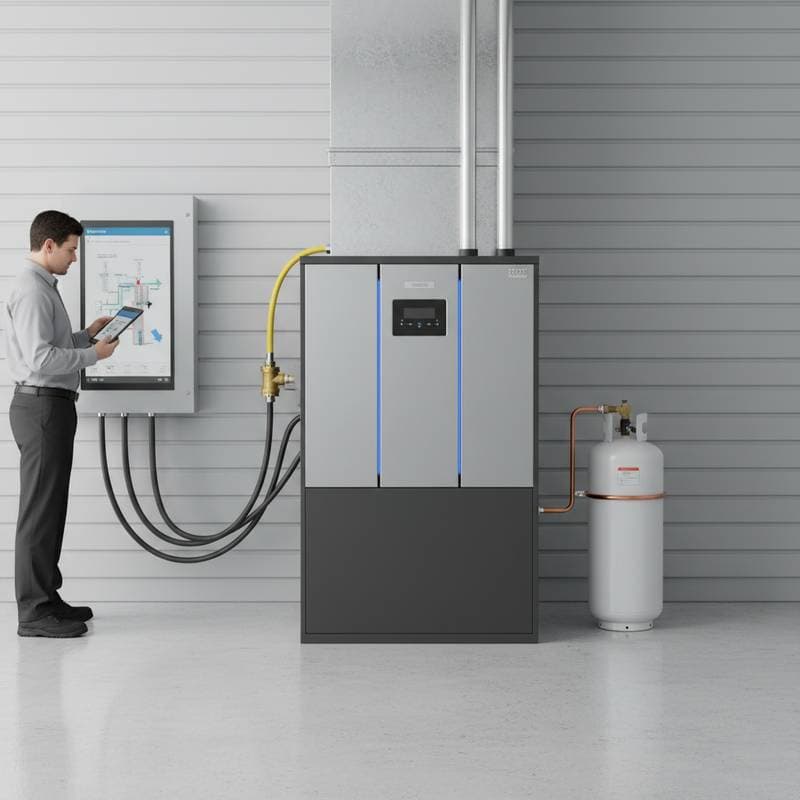Tri-Fuel HVAC: Uninterrupted Comfort During Power Outages
Power outages disrupt home heating and cooling at critical moments, often due to severe storms, grid overloads, or scheduled maintenance. These events leave standard systems inoperable, compromising indoor comfort and safety. A tri-fuel HVAC system addresses this vulnerability by operating across three energy sources, delivering flexibility and reliability when electricity fails. This guide explains the features, benefits, and considerations for integrating such a system into your home.
Understanding Tri-Fuel HVAC Systems
A tri-fuel HVAC system functions as a versatile heating and cooling unit capable of utilizing electricity, natural gas, or propane. Advanced models incorporate sensors that monitor fuel availability and initiate seamless transitions between sources. Certain configurations also accommodate solar panels or battery storage for enhanced sustainability.
This multi-source capability operates like a redundant power network within a single unit. When electrical service interrupts, the system shifts to gas or propane without user intervention. Such design maintains consistent performance throughout seasons, preventing discomfort from energy disruptions.
The Importance of Tri-Fuel Systems for Outage Preparedness
Homeowners face rising risks from unreliable energy supplies, exacerbated by extreme weather patterns and infrastructure challenges. Traditional electric heat pumps or gas furnaces halt during blackouts, exposing residents to temperature extremes. Tri-fuel systems provide an integrated safeguard, ensuring operational continuity.
Key advantages during outages include:
- Sustained heating and cooling to preserve indoor conditions
- Automated fuel transitions that eliminate manual adjustments
- Adaptable energy selection based on availability and cost
- Reduced anxiety through dependable home environment control
These features position tri-fuel HVAC as essential for regions prone to frequent disruptions.
Indicators for Upgrading to a Tri-Fuel System
Homeowners should evaluate their current setup if certain conditions apply. Frequent local outages signal the need for diversified energy options. Reliance on single-source electric systems heightens vulnerability during grid failures.
Other relevant factors encompass:
- Absence of natural gas infrastructure, necessitating propane alternatives
- Preference for non-generator backups to avoid noise and fuel storage issues
- Goals to optimize energy expenses or incorporate renewables
Adopting a tri-fuel system layers resilience onto existing HVAC infrastructure, enhancing both comfort and security against unforeseen events.
Factors Influencing Tri-Fuel HVAC Costs
Installation expenses for tri-fuel HVAC systems fluctuate according to home-specific variables and regional pricing. Contractors provide customized estimates after assessing site conditions. Primary cost determinants include:
-
System Capacity and Scale
Proper sizing requires a detailed heat load analysis to match unit output with home square footage and insulation levels. Oversized or undersized units lead to inefficiency and higher costs. -
Fuel Integration Options
Pre-equipped models simplify setup, while retrofits demand additional kits for propane or gas compatibility. Complexity in fuel line modifications elevates overall pricing. -
Installation Demands
Integrating multiple connections, such as electrical panels and gas vents, extends labor hours. Existing infrastructure, like pre-installed gas lines, reduces these expenditures. -
Efficiency Specifications
Units with superior SEER or AFUE ratings consume less fuel, offsetting initial investments through utility savings. Fuel-switching capabilities further optimize operational expenses. -
Manufacturer Quality and Coverage
Premium brands deliver durable components and extended warranties, justifying higher upfront costs with long-term dependability.
Consult a certified technician for a precise quote tailored to your property.
Comparing Tri-Fuel HVAC to Conventional Systems
Energy Adaptability
Conventional furnaces or heat pumps depend on a solitary fuel type, rendering them useless if supply ceases. Tri-fuel systems mitigate this by alternating between electricity, gas, and propane, sustaining functionality amid external failures.
Performance and Expense Management
Electric heat pumps excel in moderate climates yet falter in harsh winters, while gas units provide robust output but tie users to utility availability. Tri-fuel configurations harmonize these strengths, enabling selection of electricity during off-peak pricing or gas during peak efficiency periods.
Security and Dependability
Portable generators pose hazards like carbon monoxide exposure if improperly managed. Tri-fuel HVAC integrates backups directly, adhering to safety standards and minimizing operational risks.
Steps in Tri-Fuel HVAC Installation and Daily Use
Preparation streamlines the process and ensures optimal results. Technicians follow a structured approach to installation and ongoing management.
-
Initial Site Assessment
Professionals examine electrical capacity, gas accessibility, and installation space. This evaluation identifies compatible configurations and potential upgrades. -
Equipment Selection
Collaborate with the technician to select a unit aligned with home dimensions, fuel preferences, and performance targets. -
Fuel Infrastructure Connection
Installers secure links to gas or propane supplies, incorporating venting systems and regulatory-compliant safety mechanisms. -
System Testing and Calibration
Post-installation, the unit undergoes thorough testing to verify automatic switching and efficiency. Users receive guidance on controls and monitoring. -
Routine Operation and Maintenance
Daily use involves minimal input, with the system handling fuel shifts independently. Schedule yearly professional tune-ups to inspect components and prevent issues.
Frequently Asked Questions
How does fuel switching occur in a tri-fuel HVAC system?
Integrated sensors monitor energy availability and trigger transitions automatically. This process requires no homeowner action, ensuring uninterrupted service.
Is professional installation required for tri-fuel systems?
Yes, due to the involvement of gas handling, electrical wiring, and compliance standards. Licensed experts guarantee safe and effective setup.
What maintenance is necessary for tri-fuel HVAC?
Perform monthly filter replacements and annual professional inspections. Focus on fuel lines, controls, and overall system integrity to sustain performance.
Does a tri-fuel system increase operating costs?
Costs vary with local fuel rates and usage patterns. The ability to choose economical sources often results in net savings compared to single-fuel alternatives.
Can tri-fuel systems integrate with solar or batteries?
Advanced units support such connections, extending outage resilience through renewable inputs and stored power.
Secure Reliable Comfort for Your Home
Tri-fuel HVAC systems deliver essential protection by merging diverse energy options into one robust framework. Homeowners gain assurance in maintaining ideal temperatures regardless of grid stability. Schedule a consultation with a qualified professional to assess how this technology fits your needs and elevates home resilience.





